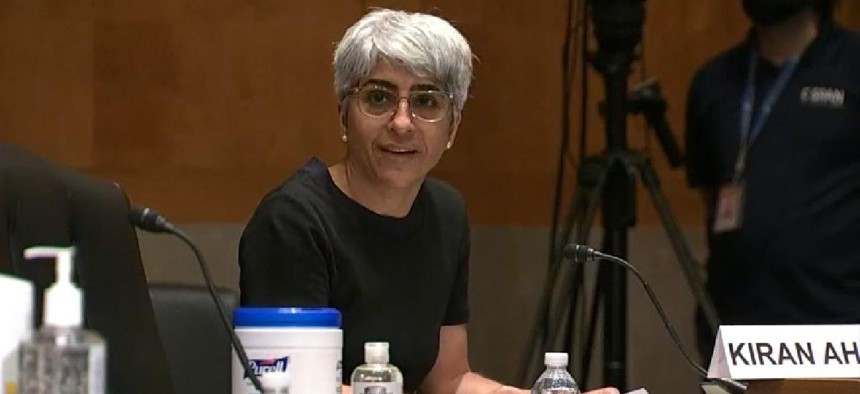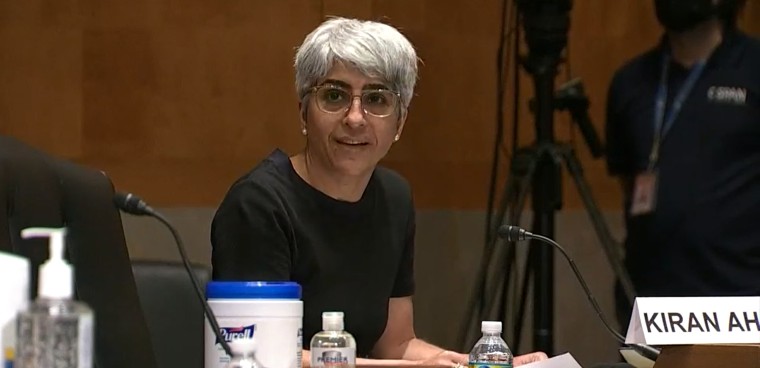Ahuja tees up 2022 plans for OPM

The Office of Personnel Management has a long list of priorities as it rebuilds itself and rolls out policies to implement the Biden-Harris agenda.

Kiran Ahuja, now OPM director, at her Senate confirmation hearing April 22, 2021
The Office of Personnel Management has a long list of priorities as it rebuilds itself and rolls out policies to implement the Biden-Harris agenda.
Kiran Ahuja, OPM director, said that OPM wants to be a strategic human capital partner for the federal government during a National Academy of Public Administration event on Friday.
That goal is an echo of one recommendation issued by NAPA in a report mandated by Congress after efforts to merge the agency with the General Services Administration during the Trump administration, and of a recent legislative proposal that the House Oversight and Reform Committee advanced on Thursday.
Ahuja also referenced internal “rebranding” efforts at OPM to reposition the agency as external-facing.
“A lot of work is happening internally within the agency really to set ourselves up for how we want to show up with agencies, how we really want to be a leader across the federal government,” she said.
That work includes staffing up — OPM onboarded over 340 employees this year, said Ahuja.
There are also technology and budget questions.
One focus is retirement services, where the agency has been trying to make iterative improvements, including a new, cloud-based contact center, said Ahuja. Coming up: a modernized retirement calculator and a pilot online retirement application.
OPM also has a proposal pending with the Technology Modernization Fund to upgrade the agency’s health benefits comparison tool for feds to “shop” for their health benefits, said Ahuja.
That’s all in addition to efforts to move off of legacy systems to cloud-based ones.
Finally, there’s OPM’s budget, which has faced shortfalls since OPM’s background check function moved to the National Background Investigations Bureau in 2019.
A recent inspector general report from the agency’s watchdog flagged the issue, calling the background investigation function a “large component of OPM” that brought in over $2.24 billion in revenue for OPM in FY 2019.
So far, the shortfall has been mitigated with additional appropriations from Congress and a buyback program from the Defense Counterintelligence and Security Agency, according to the IG report.
The move of the background check services was “very challenging for the agency with the loss of NBIB just from a financial perspective” and has “created a significant deficit as we all know,” said Ahuja.
“We’ve been fortunate with the FY 2021 budget, as well as what we hope is where we land on the FY 2022 budget. I think those resources are really desperately needed. We are going to need to find other ways to replace the funding that we lost through NBIB,” she continued.
Governmentwide priorities
One big policy priority is supporting a talent surge to implement the recently passed bipartisan infrastructure package, Ahuja said.
“We’re going to be helping agencies align their leadership, survey their respective workforce to identify needs, plan for sourcing and recruiting, integrating hiring flexibilities and streamlining their talent search processes,” said Ahuja.
Part of that will be a USA Jobs website to target “key infrastructure hiring.”
Other OPM priorities are implementing a government-wide strategy for diversity, equity, inclusion and accessibility (DEIA) mandated in a Biden executive order; supporting a continued reliance on telework and hybrid work across government and efforts on pay and hiring.
That last priority includes forthcoming recommendations for how Biden set a $15 wage floor for feds, Ahuja said.
Top of mind is a focus on early career talent, Ahuja said. OPM is exploring the possibility of a central internship portal on USA Jobs to publicize federal internship and fellowship programs and will be issuing more guidance on moving away from unpaid internships.
On the hiring front, OPM will be launching a “hiring assessment line of business” with the Office of Management and Budget.
“We’ll be doing a big focus on supporting talent teams in agencies, sponsoring innovations in hiring and helping agencies strengthen their hiring assessments effectively,” Ahuja said.
The agency is also working on a set of legislative ideas including hiring and pay, Ahuja said. She continued to say that there’s also a “real question and conversation” needed about potential legislative changes to fully leverage a hybrid work.
OPM and the cybersecurity workforce
Finally, Ahuja detailed OPM’s efforts on the cybersecurity workforce, an in-demand set of talent with well-known pain points around pay in government, which often can’t compete with the private sector.
Some agencies have established their own personnel and systems specifically targeted to cyber talent. Ahuja referenced systems set up at the Department of Defense and the Department of Homeland Security, which just debuted its long-awaited Cyber Talent Management System.
These types of systems can create problems with internal competition for talent among agencies, she said.
“One of the biggest issues I hear from our [Chief Human Capital Officers Council] is where certain agencies have just been set up with different personnel systems because there is significant need, and it becomes a challenge to compete,” she said. Ahuja said she had recently approved critical pay for some positions within OPM “because we can’t compete with those positions in other parts of the government.”
She also noted that OPM has been focused on ensuring that agencies use the “the tools they have right in front of them, which are the special pay rates, which are recruitment and retention bonuses, critical pay rates” when it comes to cyber talent.
“Part of the work we need to do as an agency is to really be much more creative in how we’re sharing with agencies how they can use the tools they can already have,” she said.



